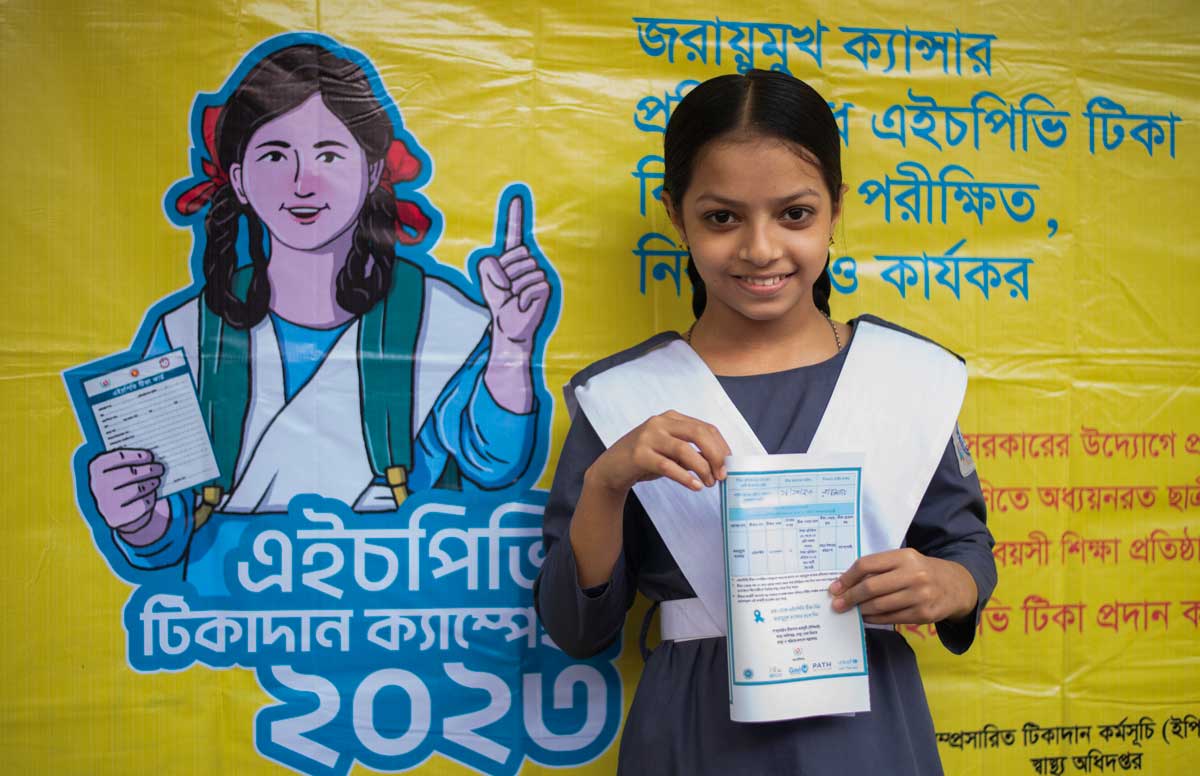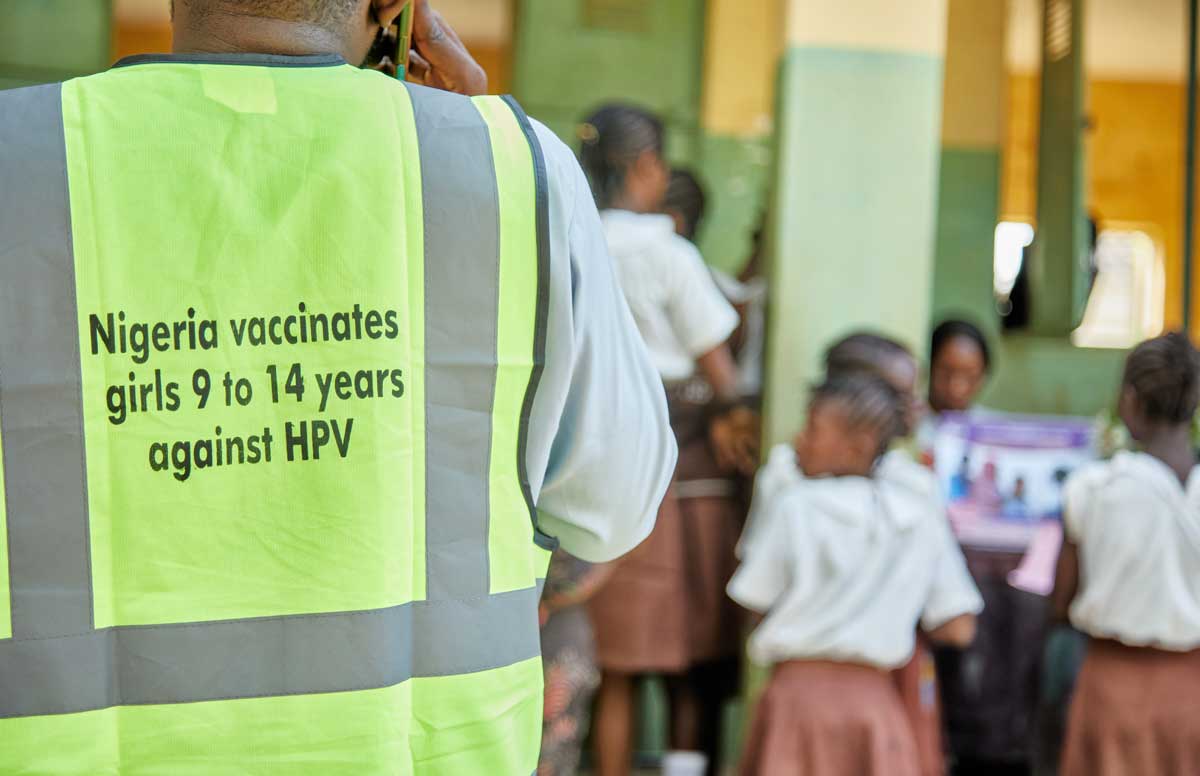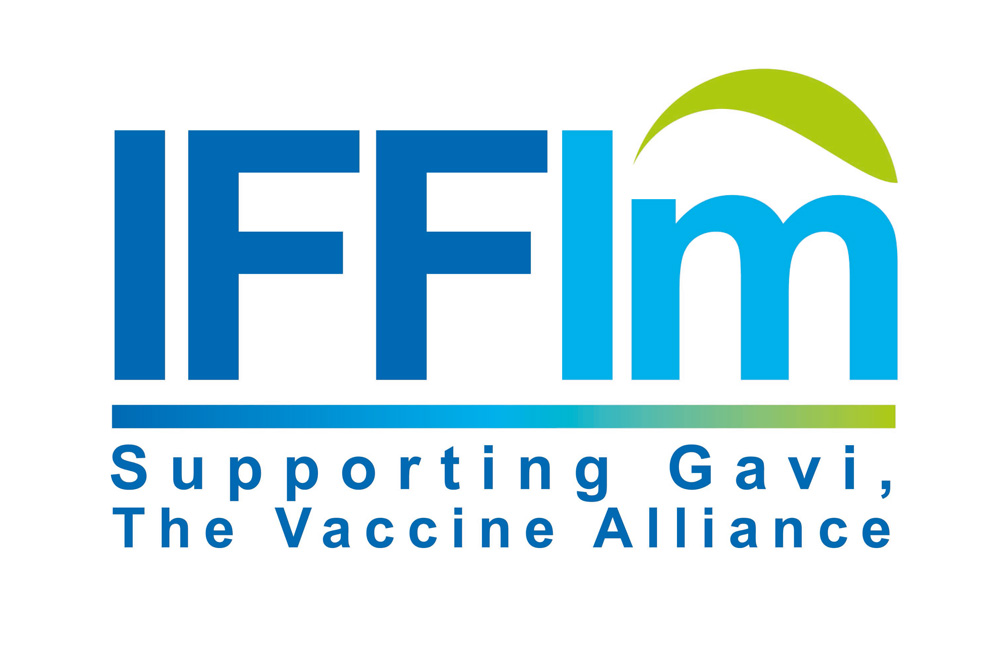HPV vaccinations rebound in 2023
- Impact
- HPV vaccinations rebound in 2023
HPV vaccinations rebound in 2023
20 December 2023

HPV vaccination in Bangladesh. Credit: Gavi/2023/Ashraful Arefin.
US$ 92 million in funding from IFFIm supports Gavi programme.
US$ 92 million in funding from IFFIm supports Gavi programme
Announcements
IFFIm impact: HPV
IFFIm supports Gavi’s HPV programme with funding of US$ 92 million.
Revitalising HPV vaccines in low- and middle-income countries is one of Gavi’s strategic must-wins.
HPV vaccinations accelerated throughout 2023 with ten new launches in seven countries introducing immunisation campaigns. From Bangladesh to Nigeria, health workers are administering the HPV vaccine in record numbers. Gavi’s HPV programme has rebounded after supply delays and has accelerated since 2021. This past year has been a stand-out.

With IFFIm funding of US$ 92 million so far - 15% of the overall US$ 600 million Gavi has allocated for HPV programmes from 2012 to 2026 - Gavi has supported HPV programmes in 38 countries. By the end of 2022 these programmes had reached more than 16.3 million girls , equating to more than 387,000 deaths averted. Gavi has made HPV vaccination a priority in its 2021 to 2026 strategic period. Over the next few years, Gavi and its partners will focus efforts to revitalise access to the HPV vaccine, reaching 86 million adolescent girls, rapidly recovering and improving coverage and helping build sustainable vaccination programmes with a goal of preventing 1.4 million deaths.1
In 2023, Gavi and IFFIm established and funded vaccination programmes in Indonesia, Eswatini, Bangladesh, Nigeria, Cambodia and Togo. Bangladesh, Togo and Nigeria all launched their programmes by targeting a multi-age cohort (MAC) in the first year. Zambia additionally launched a MAC to support an ongoing programme.
HPV causes more than 95% of cervical cancer cases worldwide and is the most common cause of female cancer deaths in nearly half of sub-Saharan African countries. The good news: The HPV vaccine is highly effective, with 17.4 deaths averted per 1,000 adolescents vaccinated; it can prevent up to 90% of all cervical cancer cases; and it is the key intervention sharply reducing occurrences of cervical cancer. It also provides a unique opportunity to invest in the health of women and the future of girls.
Bangladesh’s first nationwide HPV rollout began in October 2023 with high demand. Estimates are that almost 5,000 women in the country die each year from cervical cancer. Now that the vaccine has been added to the routine vaccination schedule for children, the next generation will be protected.
Ariba Khandaker Adrita, a 12-year-old student who received the vaccine at school on 15 October, is among the first cohort of girls in the country to receive the cancer-blocking vaccine as part of a government-led roll-out. "After taking this vaccine, I'm feeling happy and protected from a cancer disease," she said. Her mother, Lavli Khatun, agreed. "This vaccine will protect her from a deadly disease. During my time, I didn't get this vaccine. Thanks to the authorities for providing this vaccine free of cost."
Dr Mohammed Nizam Uddin, Line Director of the Directorate General of Health Services said, "Our target is 100% coverage of the HPV vaccination among the targeted children. We hope we can cover more than 95% of the targeted population within [the 18-day campaign] time."
Nigeria also recently introduced the HPV vaccine, with leaders aiming to leave no eligible child behind. The country introduced the vaccine into its routine immunisation schedule on 24 October 2023, aiming to reach 7.7 million girls in 16 of the nation’s 36 states. The second phase of the vaccination introduction is set to start in May 2024 in 21 states.
As in Bangladesh, the need for the vaccine is great: Cervical cancer is the third most common cancer and second most frequent cause of cancer deaths among Nigerian women between age 15 and 44. In 2020 the country recorded 12,000 new cases and, in part due to low screening rates and late detections, 8,000 deaths.

"For a long time, I lived with the fear of cervical cancer after the volunteers told us how the disease was killing young and older women," said 13-year-old Desola Kareem, one of the brightest pupils in her class in Ogijo, a densely populated town in Ogun State, southwest Nigeria. "They told us that many of us may not have children of our own when we grow up because of the disease. They told us that many girls won't live up to 30 or 40 years before the disease kills them. It was scary."
“After they told us there was a vaccine to prevent the disease – and that we would all be given this medicine for free – I couldn’t contain my joy. I told my mother about it as soon as I got home, because she knew how scared I was [of cervical cancer] before then.”
Gavi, with strong support from IFFIm, will continue to invest in the future of women and girls in low- and middle-income countries with HPV vaccines, with the goal of leaving no child behind.
Share this article
Restricted Access Library
 The material in this Restricted Access Library is intended to be accessed only by persons with residence within the territory of a Member State of the European Union and is not intended to be viewed by any other persons. The material in this Restricted Access Library is provided by IFFIm for information purposes only and the materials contained herein were accurate only as of their respective dates. Certain information in the materials contained herein is not intended to be, and is not, current. IFFIm accepts no obligation to update any material contained herein.
The material in this Restricted Access Library is intended to be accessed only by persons with residence within the territory of a Member State of the European Union and is not intended to be viewed by any other persons. The material in this Restricted Access Library is provided by IFFIm for information purposes only and the materials contained herein were accurate only as of their respective dates. Certain information in the materials contained herein is not intended to be, and is not, current. IFFIm accepts no obligation to update any material contained herein.
Persons with residence outside the territory of a Member State of the European Union who have access to or consult any materials posted in this Restricted Access Library should refrain from any action in respect of the securities referred to in such materials and are otherwise required to comply with all applicable laws and regulations in their country of residence.
By clicking Access restricted content: DYNAMIC-LINK-TEXT I confirm that I have read and understood the foregoing and agree that I will be bound by the restrictions and conditions set forth on this page.
The materials in this Restricted Access Library are for distribution only to persons who are not a "retail client" within the meaning of section 761G of the Corporations Act 2001 of Australia and are also sophisticated investors, professional investors or other investors in respect of whom disclosure is not required under Part 6D.2 of the Corporations Act 2001 of Australia and, in all cases, in such circumstances as may be permitted by applicable law in any jurisdiction in which an investor may be located.
The materials in this Restricted Access Library and any documents linked from it are not for access or distribution in any jurisdiction where such access or distribution would be illegal. All of the securities referred to in this Restricted Access Library and in the linked documents have been sold and delivered. The information contained herein and therein does not constitute an offer for sale in the United States or in any other country. The securities described herein and therein have not been, and will not be, registered under the U.S. Securities Act of 1933, as amended (the "Securities Act"), and may not be offered or sold in the United States except pursuant to an exemption from, or in a transaction not subject to, the registration requirements of the Securities Act and in compliance with any applicable state securities laws.
Each person accessing the Restricted Access Library confirms that they are a person who is entitled to do so under all applicable laws, regulations and directives in all applicable jurisdictions. Neither IFFIm nor any of their directors, employees, agents or advisers accepts any liability whatsoever for any loss (including, without limitation, any liability arising from any fault or negligence on the part of IFFIm or its respective directors, employees, agents or advisers) arising from access to Restricted Access Library by any person not entitled to do so.
"Relief" for mothers in Bayelsa state as malaria vaccine makes waves
07 November 2025
